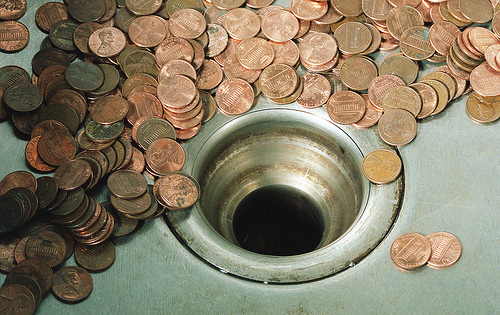Ready for a new challenge? Check out the 30-Day Spending Hiatus to buff up your budget and get your money back on track!
 Sally
Sally
Life Lessons: Learning About Money
After graduating from both high school and college, I looked back at how much I had learned, but also at how much I hadn’t. Sure, I was well-versed in my field, but I was lacking some necessary life skills. No one ever taught me about saving money and paying bills, filing taxes and buying a house. No one prepared me, financially, for the future, and no one ever taught me how to do that on my own. I was lucky enough to do my own research, and I learned through trial-and-error, but not everyone is so lucky. How can we help others avoid a potentially rocky road ahead? Let’s talk more about the importance of learning about money, spending, and saving.
Where and how do we learn about money? Most people learn about money from experience, whether it be personal or a reflection of how you were raised (i.e. how your parents handled finances). Many seek out financial advisors and consultants, or search for advice online. How do we know what tips are beneficial, and which ones could be potentially harmful? How do we set ourselves up for future financial success? Opening up a discussion with someone you trust is a great start.
How do we think about money? Money can often have a number of negative emotions attached to it, and it can, at times, be a very overwhelming subject. Changing your attitude about your finances can help you to be more proactive. Instead of feeling as though money controls your life, turn the tables and take control of it yourself. Have confidence that you can manage it wisely.
How do we talk about money? Talking about money can sometimes be difficult, whether it’s with a spouse, a relative, or a friend. Learning to talk about it regularly can help to ease any tensions that may arise from these discussions. Having discussions before problems pop up is a lot less frustrating than having them when you’re already in a tricky situation, especially if others are involved.
How do we keep track of our money? Learning to budget properly is a game-changer! Prioritizing and monitoring your spending will keep you in control of your money. The key to success is living comfortably within your means. When you see exactly where your money goes every month, you can make changes to make sure your needs are met, as well as some of your “wants.” Consistent monitoring allows you to make sure you’re staying on track, and any “wiggle room” you might have is a lot more visible, should something unexpected arise.
How do we save money? Thinking about the future is important, but sometimes forgotten about. A good way to remember to save is to set goals for yourself, instead of saving just to save. In addition to a general emergency fund, map out a few things that might be important to you later down the road – buying a house, going on a vacation, or maybe getting your car inspected. While all of those things might not be that exciting, you’ll still need to pay for things like car maintenance, so setting aside money now will feel a lot less draining on your wallet later. Paying close attention to your budget will also help you to determine how much you can save and how quickly.
How did you learn to manage your finances? Is there anything you wish you would have known earlier on? How did you grow from those experiences?
Savings Challenge Check-In: The Final Report
If you’ve been following along, you might remember that I started a year-long Savings Challenge last March (you can catch up here, here, and here). The end is in sight, and I wanted to share one final update with you!
Are You Wasting Your Money?
We all try our best to be aware of our spending, but sometimes sneaky little things can slowly start to drain your bank account.
Online Savings
We’re officially all moved in to our first house, and the only problem we’ve encountered so far is controlling my intense desire to shop. I really want to make it feel like home, so there are a few things I’d like to purchase or update. Since I’ve been budgeting for this for quite some time now (thank you, BudgetSimple!), I have a little bit of wiggle room with my spending. We’ve clearly upgraded from our first apartment, and we plan on staying here for a little while, so I want to invest in items that will stand the test of time, both physically and stylistically. I also have a very specific tone in mind when it comes to home decor and design. To make everything appear exactly the way I’m thinking, I’ve started to scour the internet for the perfect pieces. Since I’m on a mission to furnish our new space in a more “grown-up” fashion while not spending a fortune, I’ve come up with a list of tips and tricks for saving more on online purchases. Check them out and keep some of them in mind the next time you’re adding things to your virtual shopping cart!
- Search for coupon codes. I feel like “Bed Bath & Beyond coupon” is permanently printed in my search bar as of late. Whether it’s for a percentage off of your total or free shipping, you can almost always find a code for whatever store you’re shopping at.
- Buy refurbished. We generally take this route for electronics. We’ve done it with computers, tablets, phones, and televisions. Manufacturers offer this option with a guarantee that the previously returned items have met their standards and are suitable for purchase. Good as new, but a fraction of the price!
- Be on the lookout for free shipping. Sometimes retailers will offer free shipping on specific items or within a certain department, or they’ll offer it if you spend a minimum dollar amount. Either way, it might be a good idea to add items to your cart, but wait to purchase them until a free shipping offer comes your way. I’ve even received deals from some stores for doing this as an incentive to purchase the items I’ve been eyeing up.
- Use a subscription service for frequently purchases items. This tends to apply more to household supplies. If you find yourself constantly running to the store for things like detergent, shampoo, etc., then it might be worthwhile to sign up for a subscription service (through places like Amazon.com). You’ll get a great discount for ordering on the regular, and you’ll save yourself time and money by not having to drive to the store quite as often.
- Wait for a sale. I get enough flyers and emails from stores where I’ve made purchases to know that just about anything will go on sale at some point in time. Sometimes, it’s just a matter of patience. Stores will often offer discounts on items right before a season starts (think grills and patio furniture in early spring) or at the end of the season (look for steep discounts on these same items as winter approaches, as stores will begin emptying their shelves to make room for new seasonal products).
- Check for an outlet store. A lot of big-name stores have an outlet version, whether it’s a brick-and-mortar location or a particular section of their website. You can often snag markdowns on last year’s models of furniture or housewares, or discounted scratch-and-dent items for a steal.
- Price matching. This one doesn’t always work, but it’s worth a shot. Some retailers will match competitor pricing, whether you find your numbers at another store or online. It doesn’t hurt to ask if they can do better for you!
Do you prefer shopping online or in-store? What do you do to save the most money?
Bouncing Back From Debt
Nothing is more important to your financial future than being debt-free. Credit card debt not only means that you’re spending money that you don’t have, but you’re also paying EXTRA in interest!
Why Pay For What You Can Get For Free?
There are so many things that we pay for every day that we could be getting for free.
Big Purchases and Your Budget
We are officially moving next week! While we may have ended up in an unexpected place at an unexpected time, we’re very happy with our decision and we’re so excited to have a larger space to call our own. I’ve been in full-on homeowner mode lately, and I can’t wait to make a few changes to fit our new place.
Where You Could Be Losing Money, And How to Save It
You might think you’re getting the most for your money, but are you really? There are a ton of ways that we could be losing money and not even realize it!
Money Etiquette
I make it a habit to spend one day per week with my younger sister, which is fondly referred to as “Sister Sunday” now. We usually go out to lunch and then spend the day watching an assortment of bad television. We’re not very particular, but when our budgets are tight for the month, we tend to scrap by with a quick, inexpensive meal together. This past weekend, we were at a local pizza place where they basically brought us our drinks and our meal, and then disappeared. The bill came, which was pretty cheap, but it left my sister wondering how you tip in this situation – do you tip on service, even when it’s minimal, or do you tip based on the cost of the bill?










